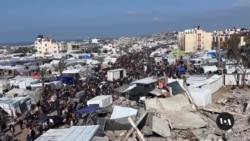An Al Jazeera journalist covering a hospital raid in Gaza on Monday was beaten and detained by Israeli forces for around 12 hours, the network said.
Al Jazeera reported that members of the Israel Defense Forces assaulted their Arabic language correspondent, Ismail al-Ghoul, destroying his equipment and arresting him along with other media and hospital workers.
Al-Ghoul had been forced to strip naked before being led away by the soldiers, Al Jazeera said. He was released late Monday, according to the Qatari news outlet.
Al Jazeera and international media watchdogs condemned the arrest.
“Al Jazeera condemns the ongoing crimes committed by the Israeli occupation forces against journalists and media professionals in Gaza and renews its call for an immediate halt to these horrific attacks,” the outlet said in a statement.
The IDF did not immediately reply to VOA’s email requesting comment. The Israeli military described its operation to take control of al-Shifa hospital in Gaza City as an effort to “thwart terrorist activity.”
Following al-Ghoul’s arrest, some analysts on the social media platform X cast doubt over his credibility as a reporter. They said he worked previously for Hamas-affiliated news outlets and that inactive social media accounts appeared to indicate pro-Hamas sympathies.
Al Jazeera did not immediately respond to VOA’s request sent late Tuesday for comment on its reporter.
The arrest highlights the risks for reporters working in Gaza. Journalists confront restrictions on access from both sides, and the death toll for media is the highest for any conflict.
The National Press Club in Washington on Tuesday called for Israel and Hamas to “cease targeting journalists and end all threats to them and their families.”
Israel was a leading jailer of journalists as of late 2023, says the New York-based Committee to Protect Journalists. On CPJ’s annual census of reporters imprisoned for their work, the country ranked sixth globally, with 17 in jail.
The group said that all those detained had been arrested in the West Bank after Hamas launched its October 7 terror attack on Israel.
As of Tuesday, 95 journalists and media workers have been killed since the war began: 90 Palestinians, three Lebanese and two Israelis, according to CPJ.
Israel has previously denied to VOA that it targets journalists.
A spokesperson for the Ministry of Foreign Affairs last month told VOA that Israel is “fighting against a murderous organization that massacred over 1,200 people on October 7 and is committed to repeating the massacre over and over again.”
Hamas is “manipulating information of civilians and reporter victims,” the spokesperson said.
Among the reporters killed since the war began is Issam Abdallah, a Lebanese video journalist for Reuters. Abdallah was killed, and six other journalists were injured by shelling as they reported October 13 from southern Lebanon near the Israeli border.
Findings by a United Nations investigation into the incident determined that an Israeli tank fired two 120 mm rounds at a group of "clearly identifiable journalists" in violation of international law, Reuters reported.
The United Nations Interim Force in Lebanon said in a report that its staff did not record any exchange of fire across the Israel-Lebanon border for more than 40 minutes before the tank fired on the journalists.
“The reason for the strikes on the journalists is not known,” a summary of the report said.
IDF spokesperson Nir Dinar told Reuters that Israeli forces would continue to look into the incident.
“The IDF deplores any injury to uninvolved parties and does not deliberately shoot at civilians, including journalists,” Dinar said. “The IDF considers the freedom of the press to be of utmost importance while clarifying that being in a war zone is dangerous.”
Media watchdogs say that even before the latest conflict, the IDF had a history of targeting journalists.
A May 2023 report by CPJ found that Israeli soldiers were responsible for the deaths of 20 journalists — 18 of them Palestinian — over the past 22 years. Despite investigations by Israel, no one has been held accountable, the report found.
Nour Odeh, a Palestinian political analyst and former Al Jazeera reporter, told VOA her colleagues in Gaza don’t sleep in the same place as their families out of fear that they’ll be targeted over their work.
“I think how vibrant the media landscape in Gaza was, and how inspiring it was. And it’s difficult for me to imagine that landscape without some of the friends who’ve been killed, some of the colleagues who are gone,” said Odeh, who is based in Ramallah.
“That whole landscape is completely altered. And the ones who’ve survived are scarred,” she added.
But despite the risks, and with many journalists in Gaza displaced by the fighting, reporters are still covering the situation there.
Since the war began, the press freedom group Reporters Without Borders, or RSF, has provided journalists in Gaza with places to work and equipment.
Working with the Arab Reporters for Investigative Journalism, RSF has helped 90 journalists in Gaza, including by establishing three tents for media to work in. It also provided items such as laptops and phones.
“To address the shocking conditions in which journalists in Gaza are living and working, RSF and its partner ARIJ are providing support in the field to these reporters, so that they can continue to provide the world with reliable and independent reporting from the besieged enclave,” RSF editorial director Anne Bocandé said in a statement.
“We demand their immediate protection,” she added.








